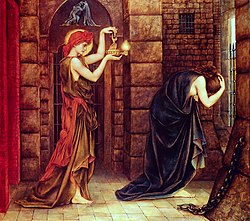| Pronunciation | /hoʊp/ |
|---|---|
| Gender | Unisex (more common for females) |
| Origin | |
| Word/name | Old English |
| Meaning | the virtue of hope |
| Region of origin | English-speaking countries |
| Other names | |
| Related names | Amal, Elpida, Elpis, Esperanza, Nadezhda, Nadia, Nadine, Omid, Shprintza, Shprintze, Shprintzel, Spes, Tikvah, Nada |

Hope is a given name derived from the Middle English hope , ultimately from the Old English word hopian [1] referring to a positive expectation or to the theological virtue of hope. It was used as a virtue name by the Puritans. [2] Puritans also used Hope as an element in phrase names, such as Hope-for, Hopeful, and Hope-still. [3]
Contents
The name is also the usual English translation of the Greek name of Saint Hope, an early Christian child martyr who was tortured to death along with her sisters Faith and Charity. She is known as Elpis in Greek and Spes in Church Latin and her name is translated differently in other languages.
Faith, Hope and Charity, the three theological virtues, are names traditionally given to triplet girls, just as Faith and Hope remain common names for twin girls. There were 40 sets of twins named Faith and Hope born in the United States in 2009, the second most common name combination for twin girls. [4] One example were the American triplets Faith, Hope and Charity Cardwell, who were born in 1899 in Texas and were recognized in 1994 by the Guinness Book of World Records as the world's longest lived triplets. [5]
Hope has been among the top 1,000 names given to girls born in the United States since 1880 and has been among the top 500 since 1909. It was ranked as the 231st most popular name for girls born in 2011 in the United States, down from its peak ranking of No. 144 in 1999. The name Hope is also given to males, but it's usually given to girls. [6]